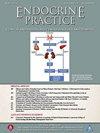Reassessing the Risk-Benefit Profile of Thiazolidinediones: Cardiovascular Risks and Stroke Prevention Through Real-World Data
IF 4.6
3区 医学
Q2 ENDOCRINOLOGY & METABOLISM
引用次数: 0
Abstract
Objectives
Research has increasingly explored the benefits of thiazolidinediones (TZDs) beyond diabetes management, particularly in reducing stroke and dementia risks. However, concerns about cardiovascular adverse events, especially heart failure (HF), necessitate a re-evaluation of TZD-associated cardiovascular risks using real-world data.
Methods
This study re-evaluates the cardiovascular risks of TZDs and their efficacy in stroke prevention. We conducted a real-world pharmacovigilance study using the US Food and Drug Administration Adverse Event Reporting System (FAERS) database (January 2004 to December 2023) to assess cardiovascular risks associated with TZDs, including myocardial infarction, HF, and stroke. Multivariable logistic regression adjusted the reporting odds ratio from the disproportional analysis. Additionally, a network meta-analysis of clinical studies (January 2000 to March 2024) examined the efficacy of TZDs in stroke prevention.
Results
Our analysis of the FAERS database revealed significantly higher cardiovascular risks associated with TZDs. However, clear differences exist in cardiovascular risks between pioglitazone and rosiglitazone. Rosiglitazone was linked to a markedly increased incidence of myocardial infarction, HF, and stroke. In contrast, we didn’t observe strong cardiovascular risks associated with pioglitazone. Instead, pioglitazone was shown to slightly heighten the risk of HF. Further, the network meta-analysis, based on SUCRA rankings and ranking probabilities also disclosed similar findings: when compared to placebo, rosiglitazone increased stroke risk, while pioglitazone reduced stroke incidence in individuals with diabetes and prediabetes.
Conclusions
Our analysis shows that pioglitazone has potential therapeutic effects on stroke prevention and fewer cardiovascular adverse events compared to rosiglitazone, underscoring the importance of reassessing TZD safety for optimal patient outcomes.
重新评估噻唑烷二酮类药物的风险-收益概况:通过真实世界数据的心血管风险和卒中预防。
研究越来越多地探索了噻唑烷二酮(TZDs)在糖尿病管理之外的益处,特别是在降低卒中和痴呆风险方面。然而,考虑到心血管不良事件,特别是心力衰竭(HF),有必要使用实际数据重新评估tzd相关的心血管风险。方法:本研究重新评估TZDs的心血管风险及其预防脑卒中的疗效。我们使用美国食品和药物管理局不良事件报告系统(FAERS)数据库(2004年1月至2023年12月)进行了一项现实世界的药物警戒研究,以评估与tzd相关的心血管风险,包括心肌梗死、心衰和中风。多变量逻辑回归调整了非比例分析的报告优势比。此外,一项临床研究网络荟萃分析(2000年1月至2024年3月)检验了tzd预防中风的功效。结果:我们对FAERS数据库的分析显示,TZDs与心血管风险相关。然而,吡格列酮和罗格列酮在心血管风险方面存在明显差异。罗格列酮与心肌梗死、心衰和中风发生率显著增加有关。相反,我们没有观察到与吡格列酮相关的强烈心血管风险。相反,吡格列酮显示略微增加HF的风险。此外,基于SUCRA排名和排名概率的网络荟萃分析也揭示了类似的发现:与安慰剂相比,罗格列酮增加了卒中风险,而吡格列酮降低了糖尿病和前驱糖尿病患者的卒中发生率。结论:我们的分析显示,与罗格列酮相比,吡格列酮在卒中预防方面具有潜在的治疗作用,心血管不良事件较少,这强调了重新评估TZD安全性以获得最佳患者结局的重要性。
本文章由计算机程序翻译,如有差异,请以英文原文为准。
求助全文
约1分钟内获得全文
求助全文
来源期刊

Endocrine Practice
ENDOCRINOLOGY & METABOLISM-
CiteScore
7.60
自引率
2.40%
发文量
546
审稿时长
41 days
期刊介绍:
Endocrine Practice (ISSN: 1530-891X), a peer-reviewed journal published twelve times a year, is the official journal of the American Association of Clinical Endocrinologists (AACE). The primary mission of Endocrine Practice is to enhance the health care of patients with endocrine diseases through continuing education of practicing endocrinologists.
 求助内容:
求助内容: 应助结果提醒方式:
应助结果提醒方式:


